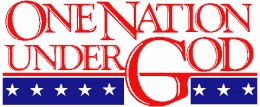I America a "Christian Nation"? What does that term even mean?
I America a "Christian Nation"? What does that term even mean?
I often here that America is a "Christian Nation". Do you agree or disagree with this? And what, exactly, does that mean? Clearly, not nearly all Americans are Christians. Does this mean that a few of the first settlers in America came here for religious freedom? Does this mean that a number of the founding fathers would have called themselves Christians? Does it mean that more people in this country would currently apply the label "Christian" to themselves than would call themselves atheists or Muslims?
If you mean The United States of America, the majority of the population claim to be Christian, whether many of them would be recognised as christians by Jesus Christ is entirely another matter. It is certain that the most vocal of the "christian right" exhibit few traits that could get themselves recognised as followers of the Christian God, i.e love, understanding, care for the less fortunate etc.
- Old Empresarioposted 14 years ago
0
Our culture is about money, not God. Since Christianity is also about money, it was inevitable that the two would eventually come together. "Under God" was slipped into our official pledge of allegiance in the 1950s. Prior to that, there was no reference to God in it. "In God we Trust" became the US motto in the 1950s as well. It can be found struck on our coins. The original thirteen colonies were made up of three groups of colonies. Only one of them (New England) was build on a religious foundation. The southern colonies and the Dutch in New York could not have cared less about religion. The founding fathers were not particularly religious people, though they usually referenced some sort of supreme being or divine providence in their speeches and official correspondence. In the 1790s, the more evangelical Christian religions (Methodists and Baptists) started to appear just as the establishment Anglican, Lutheran, and Puritan churches started to decline. Immigration boosted Catholicism and Lutheranism. Because religions are not taxed, like every other person and corporation, they have become a foolproof business model in the southern "Bible Belt" where public education is weak and non-denominational churches are strong. Mega churches sprout up and pay no property tax to contribute to the local school districts. But the fact that someone is very religious does not make them stupid. I know plenty of engineers who are staunch Christians for example. They are ignorant as hell, but not stupid. One good use for religion is that it creates an orderly and efficient society. With a few exceptions, I generally prefer the company of Christians to atheists. Christians are usually very friendly.
It means that America was founded on the principles of Christian faith...a belief in God as the supreme being. A belief that only God can grant and take away certain rights and liberties of mankind. The fact that other religions have come to this country is a function of our nation's willingness to be a melting pot of people. It is by no means an indication that we should abandon those principles on which it was founded and has served it exceptionally well for so long. I have a simple philosphy...if you want to come to America, come here to embrace the principles, beliefs and love upon which it was founded. Don't come here and expect America to restructure itself to accomodate your needs. If that is your priority maybe you should stay where you were. Every organization and person, for that matter, needs a center line, a basic to come back to when the road gets rough and the direction is foggy. If we give up our found principles, we no longer have that center line and are basically wandering around lost. WB
America was founded on principles that survived religion, NOT principles that were born IN religion. The founding fathers understood that no single faith should reign supreme, that religion should be separate from government. THAT's what we are.
The term is simply stated to control a population. Religion is used as a means to justify certain actions. Why must we care that our leader is a 'Christian' or not. It certainly shouldn't sway our opinion on their morals at this time in America. if you go to church can we consider you a Christian. It is a personal ideal not a cultural concern. If we are a land of freedom and pride ourselves on the idea that we have freedom of religion, I think it is odd that we are a "Christian Nation", We definetly use that as a way to make it ok to destroy other nations for power and money
It's a misleading label. In fact US pay a hefty price for it by being a target of extremist thinking that the nation's policy is more of like a Christian hegemony.
US is secular. You may find some hints of Biblical tradition like for example recital of prayer in the White House, the marking on "In God We Trust" on a US currency.America's culture is dominated by Christianity, but the nation at large is specifically and without equivocation NOT a Christian nation as laid forth by the first amendment to it's constitution. There are many many more Christians than any other one faith, but the percentage is around two thirds. That means around 1/3 of the population are not adherants to that faith in any way. Of course among that 2/3 that are Christians, you have many points of religious disagreement.
In order to adhere to the principles of the constitution however, it is every Christians civic duty to not impose their views on others in any state-sponsored way. They are free to preach the gospel to whoever will listen, but they cannot (according to the founding document of the nation) promote any religious views through public policy.The term can mean two different things. It either means that:
1) American government, society and laws are based in Christianity and the God of the Bible
or
2) That the majority of Americans are Christians therefore it is a "christian nation"
The second one is obviously true. America is a Christian nation in the sense that a high percentage of Americans identify themselves as Christians of one brand or another.
The first claim however is patently false to anyone with even a high school level education about the Founding Fathers and the ideas that influence the Revolution, Constitution and Declaration. The Founding Fathers were influenced by many thinkers of the Age of Enlightenment and many of the Founders were deists as opposed to being Christians (Thomas Jefferson, who penned the declaration, famously wrote his own Bible tossing out the supernatural elements and focusing on the moral teachings of Christ).
All one needs to do to dispel the myth that America is a Christian nation is read the Bible and compare it to the Constitution and American law. The Ten Commandments, for instance, are often touted as being the source of American law or having some connection to how our government works but in actuality the first commandment is in direct opposition of the first amendment.
American government and law are secular and have a lot more in common with British Common Law than any aspect of the Christian religion.I like what Titen Sxull has to say. It's a good answer. Just adding to it a bit, from what I've read, George Washington himself was very conflicted about religion, leaning toward the deism of Jefferson.
I believe we have the reputation of being a Christian nation because the first Europeans did come here for religious freedom, to practice forms of Christianity not tolerated in Europe, from Seventh Day Baptists and Quakers to Dutch Reform. But I think we could say that our nation is more Judeo-Christian than New Testament Christian. Jewish families have been here since colonial times--and the 10 Commandments are not a Christian document.
A Christian or Judeo-Christian nation though should be seen as our culture--not our government. Our government and its constitution, like Sxull said, is based heavily on the British form of government. It is a secular government. If lawmakers would realize this, the answer to the many debates would be simple. For instance, in Britain, you have a legal marriage at a local government office. Then, if you want, you can get married in your church, synagogue or mosque. In the U.S., people tend to confuse their culture with their laws. Married couples have "marriage licenses"--which marries us in the eyes of the government. It just so happens that our ministers, rabbis, etc. are allowed to sign the license, just as a justice of the peace or a judge can.Great question. I've never quite understood what people mean when they say that America is a Christian nation. Clearly, Christianity has been the most influential religion in the development of American culture. But there is no basis for the idea that our system of government was founded on Christian principles. The Constitution, after all, makes no mention of God, and the first amendment clearly states that the government cannot promote any particular religion. The Founding Fathers, like people today, did not share the same religious beliefs.
If you dig a little deeper, you have to start with the question, "What is a Christian?" Since this generic term is applied to so many different denominations, sects, and factions, it almost becomes meaningless. Since self-professed Christians cannot even agree about who is a Christian and who is not, it seems strange to proclaim any country a Christian nation. Here are some more thoughts:
http://hubpages.com/hub/Church-State-Is … -Education
http://hubpages.com/hub/Was-Jesus-a-ConservativeI would say that what the concept of "Christian Nation," means, effectively, is nothing more or less than the fact that Christianity (I would say the Calvinist strain regardless of nominal denomination but...) is a common feature of a shared Western cultural legacy that perhaps most Americans share -- whether we are indigenous people (and who have been touched, negatively, to be sure by Christianity, perhaps through the process of syncretism), White Anglo-Saxon Protestant, African-American, or persons with original descent from any other country that had been once visited by European colonialism centuries past.
I would say that some understanding of Christianity forms part of our collective unconscious.
Of course, what some people of the Right want "Christian Nation" to mean is that: America is a nation, like Israel or Pakistan, that was founded through a specific religious CHARTER.- AMBASSADOR BUTLERposted 14 years ago
0
ONE NATION UNDER GOD. Jesus Christ established the way of life for human beings on the earth. You are love you are peace you are free now be love now be peace now be free this is who you are to the core of your being. Just be it. Jesus Christ also used wisdom in how to deal with people who were not love not peace not free whom he came into contact with in his daily life on the earth. So the eternal creed for all human beings on the earth no matter where they live on the earth is just this: be love be peace be free. Just be it. You will have heaven on the earth automatically by being this in your daily life on the earth. ONE NATION UNDER GOD. AMEN.
No.... "One nation, indivisible". People forget that part and focus too much on the "under god" part. Listen to the WHOLE pledge sometimes. It's quite illuminating and has nothing to do with religious ideology.
People came to the Americas to make a better life for themselves and there was no place for them in the rest of the world. It had to do with religion only in the sense that it was ONE aspect of their lives that they didn't want the establishment controlling anymore. By the time a government came to be constructed in North America, it was founded on basic principles that were universally understood irrespective of religion; freedom, self-determination and basic decency. Everything flows from those aspects of our founding ideology. The fact that religion co-opted those principles is irrelevant. They have been tried and found true in many different cultures and many different religions. Saying that they came from God is insulting to the people who first held those beliefs, people who were fighting AGAINST persecution at the hands of religious leaders.
The United States of America is a nation founded on principles that also happen to have become principles that many (but not all) religions profess. The founders also went out of their way to divorce religious law from government law. That is not an accident. Since then, our inclusion of "under god" in the pledge and the inclusion of "In God we Trust" on our money were done by religious people who were afraid that their religious beliefs were not being considered in government, and now whenever someone brings up the idea of removing those words, the opposition trots out "religious freedom" as a battle cry, using the very ideology that was created to PREVENT such language creeping into government in order to support it.
It is an tragic misunderstanding of what the United States stands for.
Related Discussions
- 152
Our Founding Fathers Were Not Christians
by cooldad 13 years ago
Were the founding fathers of this country Christians? I have always been under the impression that our country was founded by people who were escaping religious persecution. Why then, do so many people claim that this country was created under Christianity? I could be wrong, but I...
- 31
Wasn’t American founded a Christian nation?
by wba108@yahoo.com 12 years ago
Wasn’t American founded a Christian nation? By Christian nation, I mean that its laws and institutions were largely shaped by Christian values and ideas. The systematic study of tens of thousands of documents in founding era conclusively proves America's Christian roots. Even in a casual perusal of...
- 17
Was The United States Founded As A Christian Nation?
by PhoenixV 10 years ago
Was The United States Founded As A Christian Nation?
- 377
Sarah Palin Says America Is A Christian Nation
by Pandoras Box 15 years ago
What do you think? I'm not gonna argue it, though I may come in later and post my opinion, but I wondered if many people here would agree with that term as an apt description of our country. Additionally she says“Lest anyone try to convince you that God should be separated from the state, our...
- 25
The Truth about The Separation of Church and State
by Mick Menous 10 years ago
As far as this whole Separation of Church and State thing in the United States is concerned, I personally believe that it is necessary. For example, the words “Separation of Church and State” are not physically found in the US Constitution. Yet it does say that, quote:“No law shall be passed...
- 7
Is America a Christian or pagan nation?
by allweathersforum 14 years ago
Is America a Christian or pagan nation?I am studying this issue in America today and would like to have your honest opinion. You may be an atheist, Buddhist, Christian Muslim etc…, but I would like to have your answer according to your impression of the constitution, history, and how the government...















